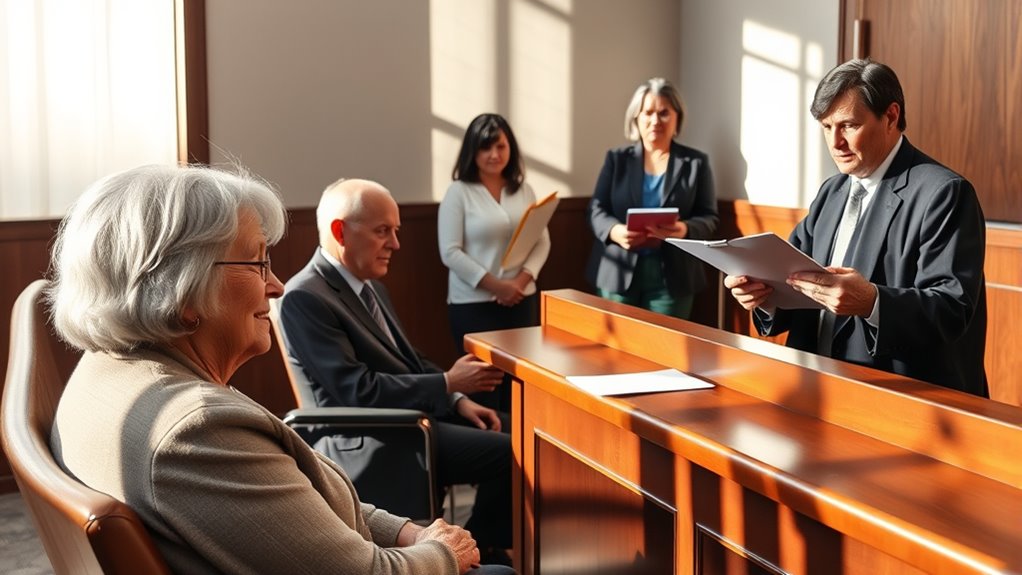Guardianship and conservatorship are legal steps you take when someone can’t make personal or financial decisions for themselves. Guardians handle living arrangements and healthcare, while conservators manage finances. To set these up, you’ll file a court petition, provide evidence of incapacity, and participate in hearings. The court then oversees the guardian or conservator’s duties through regular reports. If you want to explore ways to plan ahead or learn more about alternatives, keep going.
Key Takeaways
- Guardianship manages personal and medical decisions, while conservatorship oversees financial affairs; both require court approval.
- Establishment involves filing petitions, providing medical evidence, and attending court hearings to determine incapacity.
- Guardianship and conservatorship roles involve fiduciary duties, regular reporting, and court oversight to ensure proper management.
- Alternatives like durable powers of attorney and living trusts can often avoid court proceedings.
- Early legal planning ensures smooth management of personal and financial matters during incapacity.
Defining Guardianship and Conservatorship

Guardianship and conservatorship are legal arrangements designed to protect individuals who can’t care for themselves or manage their finances. Guardianship involves appointing a guardian to make personal, health, and welfare decisions for an incapacitated individual.
Conservatorship, on the other hand, assigns a conservator to handle financial affairs and assets. Both processes require a formal legal process through the court, ensuring oversight and protection.
As a guardian, you make decisions about living arrangements and medical care, while a conservator manages assets, investments, and financial transactions. The court reviews and approves these appointments to ensure the incapacitated person’s best interests are prioritized.
These legal arrangements safeguard those unable to make decisions for themselves, providing structure and oversight for their well-being and finances.
When and Why Each Process Is Needed

You need these legal arrangements when someone can’t make or safeguard their personal or financial decisions. Guardianship is essential when a person, such as a minor or incapacitated adult, lacks the mental capacity to handle personal decisions, requiring a court appointment to grant legal authority. This process ensures their safety and well-being. Additionally, prophetic dreams can serve as a means of divine communication that may guide individuals in their decisions or circumstances. Furthermore, over 40% of marriages end in divorce, highlighting the importance of legal arrangements for vulnerable individuals. It is crucial to understand that uncontested divorce may simplify the process of legal arrangements for those involved.
Conservatorship is needed when an adult can still make personal decisions but can’t manage their financial assets due to physical limitations or mental decline, like dementia. A court appoints a conservator to oversee financial management, protecting assets and ensuring bills are paid.
Both processes address different needs: guardianship covers personal welfare, while conservatorship focuses solely on financial decision-making. Understanding when each is needed helps protect vulnerable individuals effectively. Additionally, it’s important to recognize that legal documents are essential in establishing these arrangements and ensuring proper oversight.
Legal Steps to Establish Guardianship or Conservatorship

Establishing guardianship or conservatorship involves several legal steps that must be carefully guaranteed to ensure the process is valid. First, you file a petition with the court in the individual’s residence area. The court requires a thorough evaluation, including medical or psychological evidence, to assess the need for a guardian or conservator. You’ll need to complete the necessary legal forms and provide evidence supporting your request. Understanding cultural intelligence can also enhance your ability to communicate effectively with all parties involved, especially in diverse situations. Additionally, it may be beneficial to consult a legal professional familiar with email marketing database practices to ensure all documentation is organized and submitted correctly.
Moreover, it is important to recognize that individual responses to such situations can vary significantly based on children’s emotional expression and other factors. The court proceedings typically include notifying interested parties, like family members, and may involve hearings where evidence is presented. A court-appointed evaluator or investigator may conduct an assessment to determine the individual’s condition. In addition, the court’s decision can be influenced by the individual’s financial needs and capacity to manage their own affairs. Throughout this process, attending hearings and submitting proper documentation are essential to establish a solid legal foundation for guardianship or conservatorship. Additionally, understanding user consent and control in legal matters can help navigate the complexities of the process.
Responsibilities and Oversight of Appointed Roles

Once appointed, guardians and conservators are responsible for managing their duties responsibly and transparently, with court oversight to make certain they act in the best interests of the ward or conservatee.
As guardians, you oversee personal care and health-related decisions, while conservators handle financial management. Both roles carry legal responsibilities, including fulfilling your fiduciary duty by avoiding conflicts of interest and maintaining proper records. It is crucial to ensure that decision-making aligns with the color accuracy needs of the conservatee, as this can impact their overall well-being. Additionally, just as dogs require safe fruits for their health, guardians must also prioritize the well-being of those in their care. Special event hours can also serve as valuable reminders of the responsibilities inherent in these roles.
You must submit regular court reports to demonstrate compliance with court orders and show that you’re managing finances or personal needs appropriately. Additionally, understanding the importance of a financial affidavit can greatly enhance the transparency of financial management within your role.
Court oversight involves periodic reviews to monitor your responsibilities and ensure proper management. Staying transparent and accountable is essential to uphold your duties and protect the well-being of those under your care.
Alternatives and Tips for Planning Ahead

Planning ahead with legal tools like powers of attorney and living trusts can provide a proactive way to manage your personal and financial decisions, often eliminating the need for court-appointed guardians or conservators. Proper estate planning, including clear legal instruments, ensures your wishes are respected and trusted agents are in place before incapacity occurs. Establishing durable powers of attorney for healthcare and finances gives your designated decision-maker authority without court intervention, similar to how effective planning can prevent potential legal complications.
An estate planning attorney can offer legal guidance to identify the best alternative solutions suited to your circumstances.
- Visualize appointing a trusted agent now to handle your affairs seamlessly.
- Use legal instruments like durable powers of attorney for immediate decision-making.
- Engage an estate planning attorney early for proactive planning and peace of mind.
- Consider incorporating electrolyte supplementation in your planning to maintain health during potential incapacity.
Frequently Asked Questions
What Are the Disadvantages of Guardianship?
You should know that guardianship has some downsides. It can take a long time, cost a lot, and requires court approval, which might delay urgent help.
It also makes your loved one’s personal info public, risking privacy.
As a guardian, you’re responsible for their well-being and must follow strict rules and reports.
Failing to do so could lead to legal trouble or financial penalties.
Can a Guardian and Conservator Be the Same Person?
You might wonder if a guardian and conservator can be the same person. The answer is yes, especially in Texas, where one individual can handle both personal care and financial responsibilities for the same ward.
However, you’ll need to meet legal requirements and stay within court oversight. Combining these roles can make decisions easier but also adds legal duties and potential conflicts of interest you should consider carefully.
What Is the Disadvantage of Conservatorship?
You might think conservatorship is a simple fix, but it can feel like losing your freedom entirely. It’s costly, draining your resources with court fees and ongoing expenses.
The process drags on, wasting your time, and your privacy becomes public spectacle.
Plus, it strips away your independence, making you dependent on others, with little room to change the arrangement if life shifts.
It’s a heavy, restrictive burden.
What Is Guardianship for Dummies?
A guardianship is when a court appoints someone to make personal and financial decisions for someone who can’t do it themselves.
You, as the guardian, take care of their health, living arrangements, and other needs, always acting in their best interests.
It’s a legal process that involves court approval and oversight, ensuring the person you’re caring for gets the support they need while protecting their rights.
Conclusion
Understanding guardianship and conservatorship is like steering a complex map—each route requires careful planning and clear direction. By knowing when and why to pursue these roles, you can ensure your loved ones are protected. Remember, your proactive steps are the compass guiding them safely through uncertain terrain. With proper legal guidance and thoughtful planning, you become the steady lighthouse guiding those in need through life’s stormy waters.









